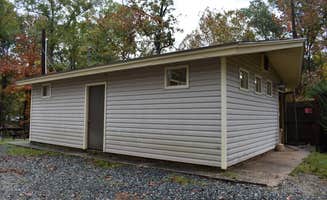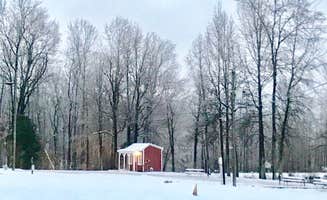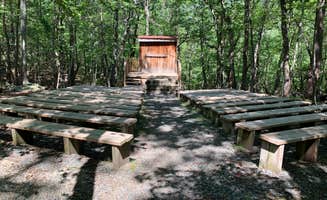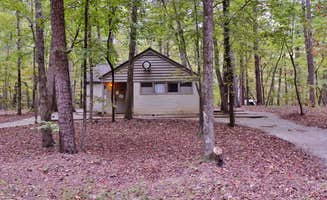Cabin camping near Gibsonville, North Carolina provides access to the Piedmont region's rolling hills and moderate climate, with elevations ranging from 600-700 feet. Most cabins in the area can accommodate year-round camping due to the mild winters and extended fall season, with temperatures rarely dropping below freezing for extended periods.
What to do
Hiking trails and waterfalls: Hanging Rock State Park offers multiple trail options with varying difficulty levels. "The hanging rock (I should say rocks since there are more than one), you can see for many miles across several counties. The shortest hike to see a waterfall is relatively easy and is only three-tenths of a mile one way," notes a visitor who found plenty to explore at this natural attraction.
Water recreation: Crosswinds Campground at Jordan Lake provides direct lake access for swimming and boating. "Loved having a double site with my parents. Close to the beach where we sat for hours," reports one camper who appreciated the water access. The swim beach is particularly popular during summer months with water temperatures reaching the mid-80s.
Mountain biking: Cool Creek Farm serves as a strategic base for mountain biking enthusiasts. According to a reviewer, "Miles of mountain bike trails within 30 minutes of the property. A great basecamp after a day of adventuring." Several trail systems in the area offer technical rides for experienced cyclists and gentler paths for beginners.
What campers like
Privacy between sites: Campers at William B. Umstead State Park appreciate the natural spacing. "Campgrounds are close but separated by trees and forest to create privacy," notes one visitor. Most cabin sites include buffer zones of native vegetation that help maintain a sense of seclusion.
Creek access: The natural water features receive consistent praise at many locations. A camper at Moonshine Creek Campground observed, "This park has a wonderful creek running through the middle of it and most short-term sites back up to it... Benches throughout even in the creek to put your feet in." The sound of flowing water adds to the camping experience.
Wildlife viewing: Many cabins offer opportunities to observe local fauna. At Hanging Rock State Park, campers report, "Deer walked right behind our site," while others mention bird watching opportunities. Morning and evening hours typically provide the best wildlife sightings, particularly around water sources.
What you should know
Highway noise considerations: Some cabin locations experience traffic sounds. At Greensboro KOA, a camper noted, "As previously mentioned, serves its purpose for an overnight. Right off the highway, and by that I mean you see, and HEAR the traffic." Request sites further from major roads when making reservations if noise is a concern.
Tent pad dimensions: If using tent camping areas, verify the pad size will accommodate your gear. At Hanging Rock State Park, a camper with a large tent warned, "We stayed at Campsite 50, and while it was in a nice wooded area with plenty of shade and a decent amount of privacy, the tent pad was smaller than expected. We brought a 10-person tent, and it was a tight fit."
Bathroom facilities vary: Cabin bathrooms range from rustic to modern. A visitor to Moonshine Creek Campground described, "The bathhouse for this area has two toilets and two showers. Each is completely private. There are outlets and sinks in all four." Call ahead to confirm whether your cabin has private facilities or requires using communal bathhouses.
Tips for camping with families
Swimming options: Jordan Lake offers dedicated swimming areas with gradual entry points. "Great Campsites, nice wooded sites and close to lake access. Great hiking trails and very family friendly," reports a camper who enjoyed the water activities with children. The designated swim beaches have no lifeguards, so parental supervision is required.
Kid-friendly trails: Several parks feature shorter trails manageable for young hikers. A Hanging Rock visitor shared, "Our kids (ranging from early elementary to preteen) managed the trails with some effort but plenty of enthusiasm. The waterfall hikes were especially fun." Most parks offer trail maps indicating difficulty levels.
Wildlife spotting games: Turn nature observation into family activities. One visitor mentioned, "From spotting salamanders near the creek to pretending they were mountain explorers on the trails, they were thoroughly entertained the whole trip." Bring identification guides appropriate for children's ages to enhance the experience.
Tips from RVers
Site leveling challenges: Some RV spots require extra work to level properly. A camper at Hyco Lake State Park warned, "The gravel sites are wide enough but ours was way off from level. Nice dog area and small playground." Bring additional leveling blocks, especially for larger rigs.
Hookup locations: Check the position of utility connections before setting up. At Deep River Campground, a camper noted, "We had to back way up in order to hook-up. Unfortunately, that meant that our primary slide was within 3 feet of a giant pine tree so there was barely enough room to open it." Most cabin campgrounds publish site maps online showing utility placement.
Cell reception variability: Despite rural settings, some areas maintain reasonable connectivity. At Moonshine Creek, a camper reported, "Surprisingly good cell reception for being in the mountains and having lots of tree cover. Got 1-3 bars ATT depending on where I was within the campground, and we had no issues using our TMobile hotspot to stream videos/tv."





